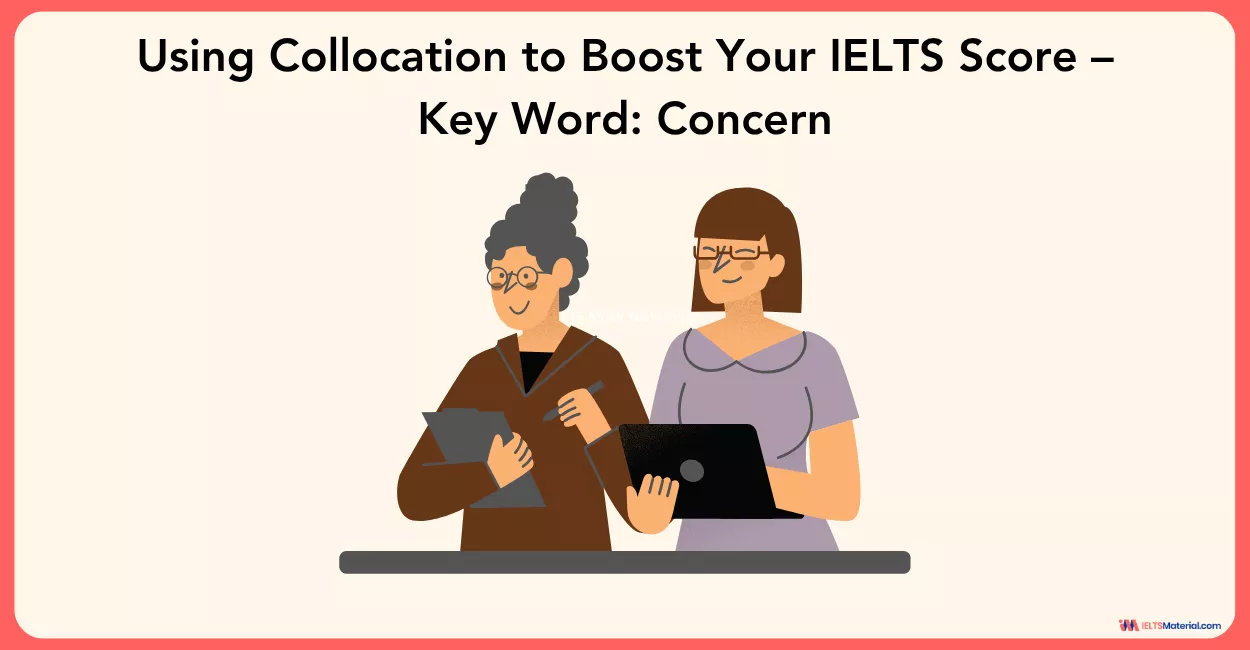Using Collocation to Boost Your IELTS Score - Key Word: Concern
3 min read
Updated On
-
Copy link
Boost your IELTS Speaking and Writing score by mastering the collocation concern. Learn to use it with verbs, adjectives, prepositions, and common expressions to naturally talk about worries, priorities, and important issues in a clear, fluent way.
Table of Contents

Limited-Time Offer : Access a FREE 10-Day IELTS Study Plan!
In IELTS Speaking and Writing, using the right collocations can significantly boost your score. One such useful collocation is “concern”, which helps you naturally express worries, priorities, and important issues. In this blog, we explore how to use concern with verbs, adjectives, prepositions, and common expressions, along with examples, so you can confidently include it in your responses and essays.
What is Concern?
Concern is used to express worry, care, or interest about something. Knowing its collocations can make your language more precise and sophisticated.
Using Concern with Verbs
- Many doctors have __________ deep concern about the safety of this new drug.
- The build-up of enemy troops on the country’s southern border is __________ great concern.
- I__________ your concern, but don’t worry – I’m all right. I know what I’m doing.
- Public concern is __________ over the number of children who leave school without any formal qualification.
- The headmaster and the staff __________ your concern about what happened on the trip to the zoo.
- Our concern for the safety of the children must__________ all other concerns.
Answer Key:
- expressed
- causing
- appreciate
- growing
- share
- override
Feeling stuck with IELTS Vocabulary? Register for our webinar and unlock your potential today!
Concern with Prepositions
- We view the situation developing in the Middle East__________ grave concern.
- The little girl hasn’t been seen for two days and there is now growing concern__________ her safety.
- The availability of drugs in schools is__________ great concern to parents.
- There is widespread concern __________ rising crime rates in our cities.
Answer Key:
- with
- for
- of
- over
Expressing Main Concerns
- As a CEO my major concern is
- As aid workers, our overriding concern is
- The Chancellor’s primary concern is
- This hospital’s main concern is
Options:
a. to improve the quality of care to our patients.
b. to reduce inflation and improve the economy.
c. to make this company more efficient.
d. to care for the hungry and the homeless.
Answer Key:
1 → c
2 → d
3 → b
4 → a
Adjectives meaning “most important”: major, overriding, primary, main
Want to improve your grammar? Get the newly launched IELTS Grammar book today!
Common Expressions and Idioms with Concern
- My private life is no concern of yours.
- Your private life is of no concern to me.
- I’d keep out of this argument if I were you. It’s a family matter and it’s none of your concern.
- I was surprised and angered by his lack of concern for his sick mother.
- You’ve been given the all-clear. The test results were negative, so there’s no cause for concern.
- In his speech, he said that global pollution should be a matter of concern to us all.
Expressing doubt:
-
My only concern about Beckham is whether he’ll be fit to play on Saturday.
Expressing sole concern:
- The safety of the hostages is our sole concern.
- Our only concern is for the safety of the hostages.
Struggling with grammar for the IELTS? Sign up for our online class & master the words to succeed!
How to Use “Concern” in IELTS Speaking & Writing?
- Speaking Part 1 & 2: Talk about worries, priorities, or personal issues using concern collocations.
- Speaking Part 3 & Writing Task 2: Discuss social, environmental, or educational issues using phrases like matter of concern, growing concern, overriding concern.
- Writing Task 1: Can describe data or trends that show public or governmental concerns.
- Idiomatic Expressions: Using expressions like no cause for concern or sole concern adds variety and fluency.
Visit IELTS eBooks store for top-rated books & elevate your IELTS preparation!
Using collocations with concern correctly can make your IELTS answers sound natural, fluent, and sophisticated. Practice combining verbs, prepositions, adjectives, and idiomatic expressions to express worries, priorities, and doubts accurately. This approach will improve both your Speaking and Writing scores.
Also Check:
- Improve Your Vocabulary for IELTS – Key Word: Space
- Improve Your Vocabulary for IELTS – Key Word: Size
- Using Collocation to Boost Your IELTS Score - Key Word: decision
- Using Collocation to Boost Your IELTS Score - Key Word: a series of
- Grammar For IELTS : The Common Grammars And Sentence Structures In English (Part 1
- Grammar For IELTS : The Common Grammars And Sentence Structures In English (Part 2)
- Using Contrast in IELTS Speaking & Writing: Advanced Grammar in IELTS
- 100+ Advanced Vocabulary Word List for IELTS (PDF Available)

Start Preparing for IELTS: Get Your 10-Day Study Plan Today!
Recent Articles

Nitika Gupt

Nehasri Ravishenbagam

Nehasri Ravishenbagam





Post your Comments